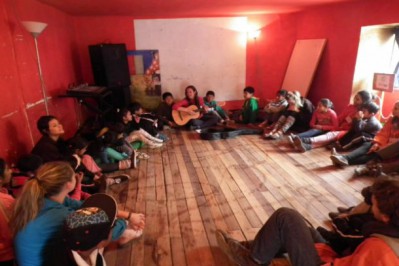CUSCO, PERU. Many organizations worldwide, rely on the help of volunteers to sustain and develop their projects. At the base of this unpaid job is the desire of individuals to help the community and assist others in need of support.
Up to over a million people visit Cusco, Peru and the Inca ruins surrounding it, every year. For somebody that has never experienced Latin America before, Cusco will enchant you at first sight, this lovely city at 3400 m of elevation, is rich in kind, friendly people and delicious food and brings its visitors so close to the sky that at night it leaves anybody speechless. But to the ones that take time to get away from the touristic area, where english seems to be the local first language, a new urban environment reveals with its issues and controversies.
The reality of this city does not differ from many others around South America. Within the Cusco department alone, more than half the residents live in poverty. An evident symptom of this issue can be seen in the streets of the city centre constantly, were a great number of child beggars populates the main plazas at every hour of the day and night. A high percentage of the children are forced into labour to help their families raise money: they often come to the city from the surrounding villages sent by their parents in the hope they will find better possibilities to work and earn money. They face neglect and abuse and they are left to take care of themselves from a very early age. As a result, illiteracy remains another critical issue, in fact many children live school before the age of 14 and a great number never attends. To this it adds the concerning problem of malnutrition which affects over a quarter of Cusco’s youth and even though Peru’s poverty rate is slowly decreasing, Cusco’s numbers do not show any sign of improvement. Several local institutions and organizations developed in the region as a result, all aiming to assist children and families and put an end to these grave issues and many others.
When choosing a program I payed careful attention on where the real intentions of the organization laid and this is how I found Aldea Yanapay project in Cusco, Peru. Yuri Valencia, is its founder. While many programs are born from a desire to change what is wrong in a community, Yuri decided to approach the difficult situation in a different way. He focused on the good aspects of human interactions and living, which were already present around him and analyzed how could these be strengthen and used to change what needed to improve. He founded a small school where kids were taught values, principles and most of all love, from which tolerance and respect come as a result.
Everything started in 2004 with this small school and within a year 60 children were attending daily and the volunteering program had started. The project has grown incredibly since then and it is now financially sustained by the Aldea Yanapay Restaurant in the city centre of Cusco and by the Hostal Magico were volunteers and travelers find place to stay and a family atmosphere. The school, which is the core and start point of Yuri’s project, welcomes children from the age of 4 to 16, they attend every afternoon after their regular classes. Depending on their age they are divided in smaller groups or families and different subjects are taught and explained. While the younger families have a great amount of time to have fun and play with their creativity, to the older ones help is given for homework as well as for learning English and computer skills.
Another important time of the day at the school is the circle of expression, a moment where all the children come together and a different topic everyday is discussed, here nobody has to fear judgement or repercussions for expressing their opinion.
In fact one of the most important aspects of these type of programs is the possibility given to these young individuals to be welcome in a safe environment of love and care, where they can express their fears and problems without worries. This is often something they do not experience in their own homes, another critical reality these children often find themselves into is in fact domestic violence and sexual abuse.
Many are the projects like this to be praised all over South America, while several organizations support themselves through their volunteers, thanks to its sub-projects Aldea Yanapay does not ask any payment only motivation, and the desire to work hard and share love with the children.
A common belief volunteers have shared with me during the past years, is the certainty that they returned home richer than they left. The kind of love and happiness these kids gave me and the other people helping at the school, has no comparison with anything else we had experienced in our regular life. These feelings are pure and they come from individuals that often have little or nothing, all that is asked in return is a hug and affection.

